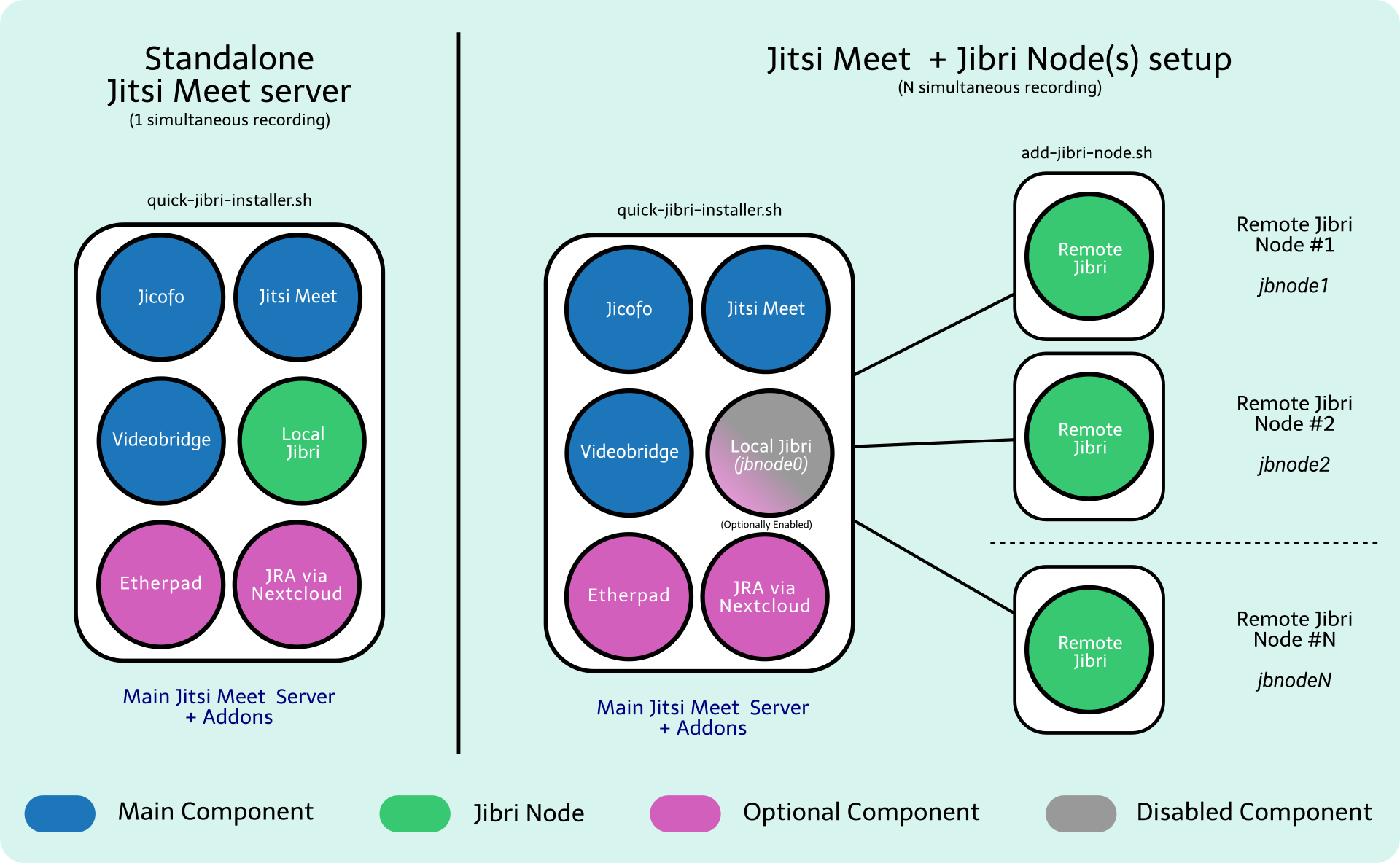forked from switnet/quick-jibri-installer
123 lines
4.6 KiB
Markdown
123 lines
4.6 KiB
Markdown
# Quick Jibri Installer
|
|
Bash installer for Jitsi Meet standalone along with Jibri on supported **Ubuntu LTS** based systems using **nginx** as default webserver.
|
|
|
|
## Usage
|
|
As for our current latest release, as we have integrated more and more features, we highly recommend to use a **purpose specific-newly spawn server** to host the jitsi-meet framework, making sure you stick to the requirements and recommendations as much as possible, in order to avoid issues.
|
|
|
|
**WARNING:** Please, avoid using this installer on your everyday GNU/Linux system, as this is an unsupported use and it will likely BREAK YOUR SYSTEM, so please don't.
|
|
|
|
|
|
### Main Server
|
|
Login into your clean server, clone git repository and run the installer,
|
|
|
|
```
|
|
git clone https://forge.switnet.net/switnet/quick-jibri-installer
|
|
cd quick-jibri-installer
|
|
sudo bash quick_jibri_installer.sh
|
|
```
|
|

|
|
|
|
If your server meet the necessary resources, then at the end on the installer you should have a working Jitsi Meet Server along with a Jibri server ready to record.
|
|
|
|
Additional jibris need to be set on separate servers, only necesary on simultaneous recordings for that please use add-jibri-node.sh.
|
|
|
|
### Add Jibri node
|
|
|
|
Copy the modified `add-jibri-node.sh` file from your early cloned installation directory once the installation is completed, to the new server meant to be a jibri node using your preferred method, then run it
|
|
|
|
**WARNING:** This file contains sensitive information from your setup, please handle with care.
|
|
|
|
```
|
|
bash add-jibri-node.sh
|
|
```
|
|
|
|
Please remember that on newer versions, jibri will record on FHD (1920x1080) so please make sure your server have enough CPU power in orther to handle the encoding load.
|
|
|
|
### Add JVB2 node
|
|
|
|
Copy the modified `add-jvb2-node.sh` file from your early cloned installation directory once the installation is completed, to the new server meant to be a jibri node using your preferred method, then run it
|
|
|
|
**WARNING:** This file contains sensitive information from your setup, please handle with care.
|
|
|
|
```
|
|
bash add-jvb2-node.sh
|
|
```
|
|
|
|
Check more details on our wiki.
|
|
|
|
## Requirements
|
|
1. Clean VM/VPS/Server using a supported Ubuntu LTS
|
|
2. Valid domain with DNS record, **mandatory** for SSL certs via Let's Encrypt.
|
|
3. open ports for JMS interaction, [see wiki](https://forge.switnet.net/switnet/quick-jibri-installer/wiki/Firewall).
|
|
4. Starting at 8 GB RAM / 4 Cores @ ~3.0GHz
|
|
* Adding resources as your audience or features you require, so your experience don't suffer from the lack of resources.
|
|
5. Webcam
|
|
|
|
### Jibri Recodings Access via Nextcloud
|
|
* Valid domain with DNS record for Nextcloud SSL.
|
|
|
|
### Jigasi Transcript (stalled)
|
|
* SIP account
|
|
* Google Cloud Account with Billing setup.
|
|
|
|
|
|
|
|
## Kernel warning
|
|
For AWS users or any cloud service provider that might use their own kernel on their products (servers/vm/vps), might cause Jibri failure to start due not allowing `snd_aloop` module.
|
|
|
|
Make sure that you update your grub to boot the right one.
|
|
|
|
Feel free to use our `test-jibri-env.sh` tool to find some details on your current setup.
|
|
|
|
## Features
|
|
* Enabled Session Recording via Jibri
|
|
* Rename Jibri folder with name room + date.
|
|
* Jibri node network.
|
|
* Automatic Jibri nodes network sync ([see more](https://forge.switnet.net/switnet/quick-jibri-installer/wiki/Setup-and-Jibri-Nodes)).
|
|
* JRA (Jibri Recordings Access) via Nextcloud
|
|
* Grafana Dashboard
|
|
* Etherpad via docker install
|
|
* Authentication
|
|
1. Local
|
|
2. JWT
|
|
3. None
|
|
* Lobby Rooms
|
|
* Conference Duration
|
|
* Customized brandless mode
|
|
* Setting up custom interface_config.js (to be deprecated by upstream)
|
|
* JVB2 nodes network.
|
|
|
|
* Enabled Jitsi Electron app detection server side.
|
|
* Standalone SSL Certbot/LE implementation
|
|
* Improved recurring updater
|
|
* Jigasi Transcript - Speech to Text powered by Google API (stalled)
|
|
|
|
## Tools
|
|
* Jibri Environment Tester
|
|
* Jibri Conf Upgrader (late 2020).
|
|
* Selenium Grid via Docker
|
|
* Start over, installation cleansing tool.
|
|
|
|
## Optional custom changes
|
|
* Optional default language
|
|
* Option to enable Secure Rooms
|
|
* Option to enable Welcome page
|
|
* Option to enable Close page
|
|
* Option to set domain as hostname on JMS
|
|
|
|
### Modes
|
|
* Custom High Performance config
|
|
|
|
## Custom changes
|
|
* Start with video muted by default
|
|
* Start with audio muted but moderator
|
|
* Set pre-join screen by default.
|
|
|
|
|
|
## Documentation
|
|
* Please check our [wiki](https://forge.switnet.net/switnet/quick-jibri-installer/wiki) for further documentation.
|
|
|
|
Please note: This program is distributed in the hope that it will be useful, but WITHOUT ANY WARRANTY.
|
|
|
|
SwITNet Ltd © - 2024, https://switnet.net/
|